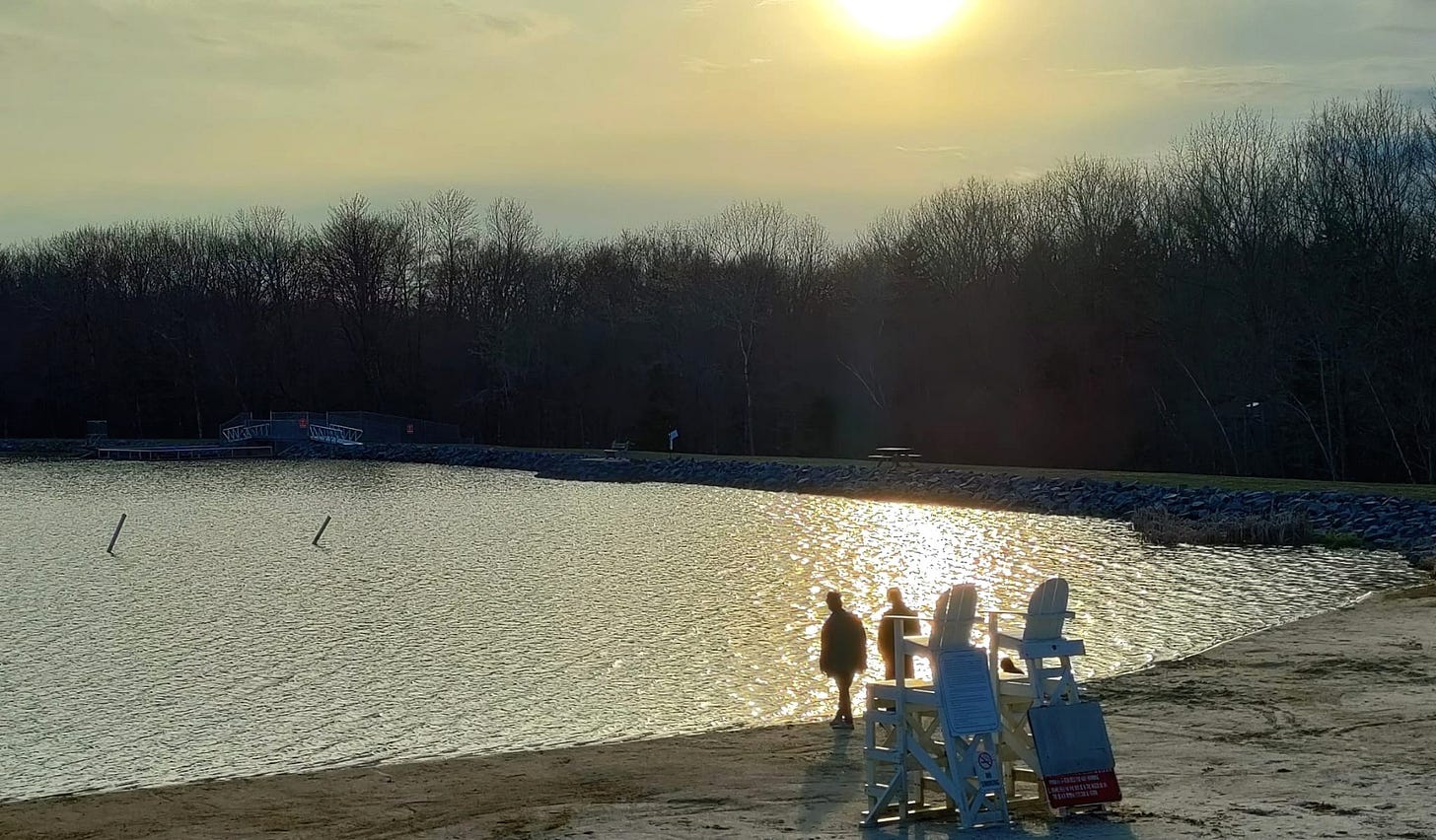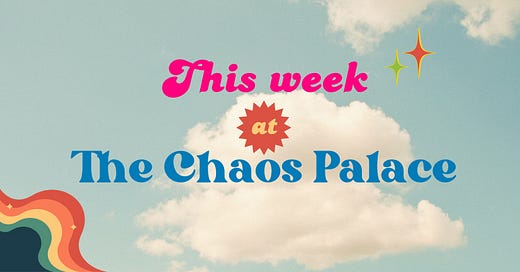This Week: Four (Other) Questions
Innate confidence and chosen family
Dear fam,
Chag sameach! This weekend is the second holiday of Passover. In Jewish tradition, there are two weeklong festivals like this one that are bookended by holy days, with a few regular(ish) days in the middle1. The holy days are meant to be set apart from the mundane (like Shabbat), a status created by not partaking in any labor or using electronic devices, and by filling the time with prayer and rest. The regular(ish) days in between the bookends are still considered holier than usual, but they aren't as strictly separated.
A week ago we celebrated the first holiday of Passover, the more famous of the two because it’s the one that comes with the Seder meal, an event soaked in pomp, circumstance, and tradition.
Our Seder was, shall we say, a bit more casual than it has been in years past. And this was extremely intentional. For the first two years of parenthood, we tried to keep Passover the way it had been pre-kids. Which is to say, a multi-hour event with 20-some guests, extensive readings in Hebrew, English, and Aramaic, a four course dinner, and so many loud songs (many of which feature banging on the table a lot).
Silly us. That plan was never going to work for our sweet, hypersensory, hyperactive Big Kid.
When she was nearly one, it was the Year of Covid and we had a Zoom seder. The next year, we had a small Seder meal after she went to sleep with two pals who had tested negative for the virus. Then, the next year, we went all out — twenty guests, full force Seder celebrations. Big Kid was nearly two, and she spent the entire evening in another room on a tablet, fully disassociated. I don’t remember the next year, although I assume it was likewise disastrous. Then last year, we figured out something cool — we could actually re-imagine the Seder to support her needs.
It was a huge success! We hippity-hopped from one item of the Seder ritual to the next, briefly blessing the wine, eating the bitter herbs, dipping the parsley in salt water. We then tried telling the Passover story in bits, all adults together.
The event may have been unorthodox, but it was shorter, more interactive, and generally more fun for everyone involved. Such a revelation! My wife and I were beyond relieved.
This year we decided to do the same thing, but with one update: We fully engaged Big Kid in Passover prep. She helped clean the playroom and shop for matzahs. She learned the story ahead of time, and we discussed the symbolism of the various items on the seder plate. We also taught her to sing the Mah Nishtanah, the four questions traditionally sung by the youngest child at the table. The tradition is for the children to pose these questions to the adults — and for the adults to answer to the best of their ability.
Finally, at the seder, we arrived at the moment for asking. “Ok! It’s time for the four questions!” I announced. Big Kid never missed a beat. “Oh great!” she exclaimed, “Cause I know some questions!” It turned out we’d forgotten to mention that the Mah Nishtanah is the four questions, so she’d been thinking of her own queries. Which she declared in a confident voice to the entire table — twelve kids and adults all listening to her at once.
“Why were the Jews enslaved?” she asked, “And why were they crying? And why did G-d save them? And why was the bush burning?”
I was blown away. First, because these were, honestly, way more interesting questions than the original ones, which have more to do with why we eat matzah. Second, because she had once more shown her incredible confidence and self-possession.
Big Kid has presence. Both of our kids do, actually. When they want to, they can both command a space. It’s incredible to see, and it’s something my wife and I are intent to encourage so they never lose this innate ability.
Over the past week, Big Kid and Toddler have both shown us their innate confidence in various ways. On three separate occasions, Big Kid declared she would make a friend on outings to playgrounds. And proceeded to do just that. How many times have I worried about saying the wrong thing? Big Kid has no such fears; she walks right up to another kid and says, “Hi, do you wanna play?” Toddler, for her part, knows her mind and her limits in ways I can only aspire to embody. I can’t count how many times I’ve heard her say, “Too scary for me,” when she encounters a big dog or a Halloween video or, “Too tall for me,” when she’s climbing a ladder at the playground. “I’m all done,” she declares when she’s full. When she’s ready for bed? She grabs my hand and says, “Pajama time, Mama.”
It seems to me that, as adults, we spend a great deal of effort trying to figure out how to listen to ourselves, recognize our internal messages, navigate social situations with aplomb. Am I hungry or bored? Am I too tired or fried to work? Do I want to take a walk? Do I like being here, with these people? Is this too much for me? I’ve spent hours in therapy re-learning how to hear the messages my daughters hear loud and clear.
As I’ve written here, I usually make my wife complete a quick survey every time we return from a social engagement. It goes something like this:
Was I weird? (Y/N)
Did I talk too much? (Y/N)
Did I overshare? (Y/N)
Did I seem normal? (Y/N)
Spending time with Big Kid and Toddler is a great reminder that I can actually be exactly who I am. If I have questions, I can ask them. If I’ve had enough, I can say so. If I’m excited about something, I can talk about it a lot. The people who love me will love this part of me, too.

As for the questions themselves, we had a good time answering them. Each adult gave a piece of the story. For the question about why G-d saved the Jewish people, our friend Meri offered a midrash (interpretive commentary) suggesting that this moment is the epitome of the give-and-take relationship between the Divine and the People. We talked about how sometimes people (Pharaoh in this case) can make a choice to take advantage of those weaker than them, and how it’s our responsibility to notice these moments and call them out. To stand up against them.
It was a rich and beautiful (if brief) conversation. Then we sang the actual Mah Nishtanah, which evolved into a jam session / costume party.
The whole evening felt heimish, which is to say like home. Like closeness, and silliness, and warmth. I think we made a good memory for our kids. I hope so. They certainly made a good memory for us.
If we have to live across the ocean from our born-family, this sweet, cozy chosen family is a pretty fantastic thing to have found. And in the midst of a deeply troubling, and turbulent time in history — I feel profound gratitude to have found this community.
Sending you much love and a happy spring-week, wherever you are and however you celebrate the oncoming warmth.
Love,
Mikhal
Hey there! Welcome to the Chaos Palace is a space uplifting ADHD, queerness, Judaism, and how to find opportunities for growth & creativity in the messiness of life.
You can support my work by sharing this post with someone you think might get a kick out of it, upgrading to a paid subscription, or just clicking the little heart button. That makes the algorithm send my words to other folks who might enjoy ‘em. Or just read! That’s huge, too, and very appreciated! Thank you, thank you!
A million years ago (so, like 2018) my wife and I had a band and we recorded a cover of this song by Yehudit Ravitz. And now Big Kid is obsessed with this song. So this one is for her.
The other one is a fall holiday called Sukkot.






